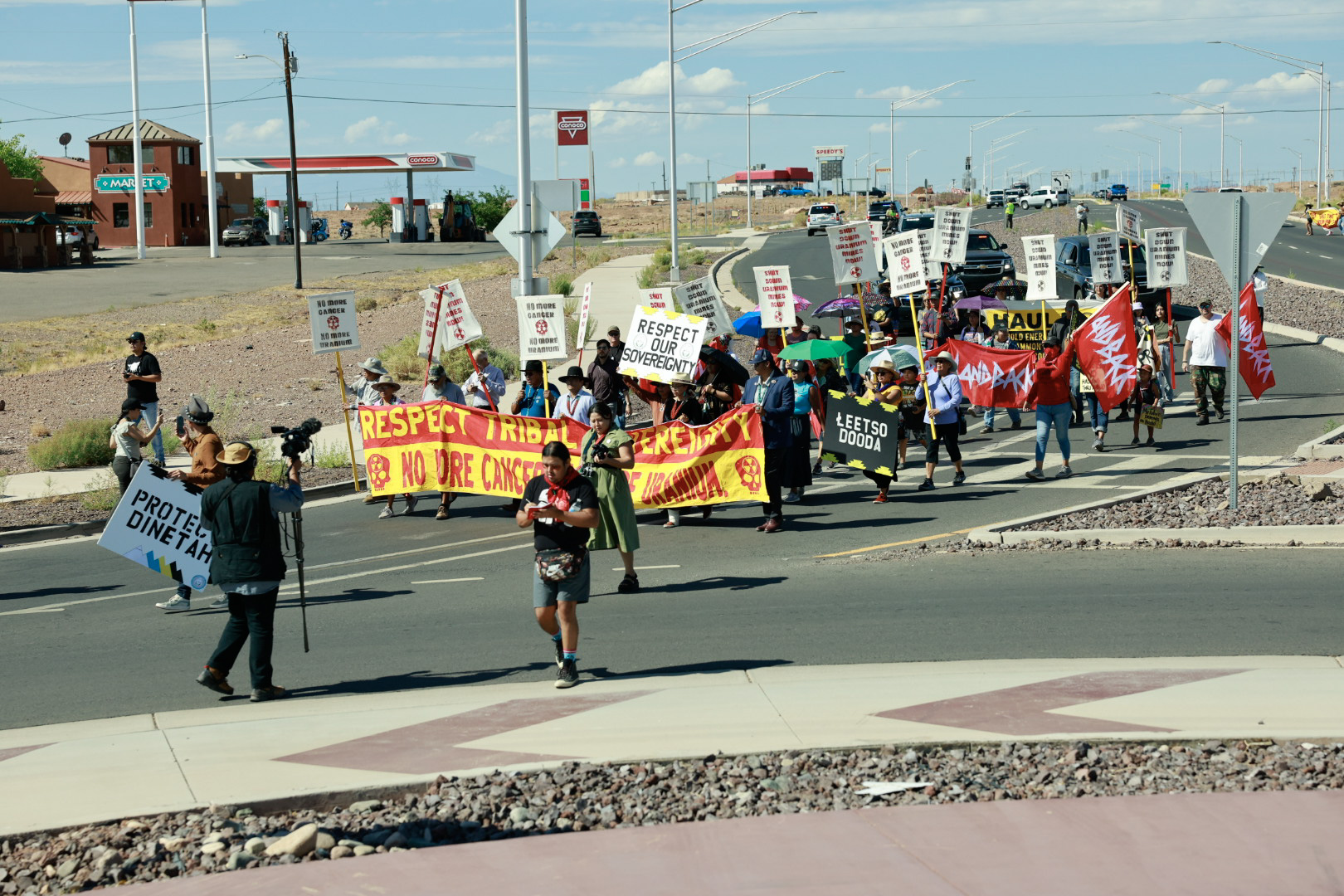
- Details
- By Levi Rickert
Opinion. On July 30, Navajo Nation President Buu Nygren’s busy schedule was interrupted just before noon by the news Energy Fuels Resources had two trucks going through the Navajo Indian reservation carrying radioactive uranium ore. He contacted the Navajo police to attempt to halt the illegal transportation of uranium ore through the largest Indian reservation in the country.
The two trucks originated at the Pinyon Plain Mine, which is owned by Energy Fuels Resources and located near the Grand Canyon. The were traveling to the White Mesa Mill in southeastern Utah.
By the end of the day, Nygren learned the trucks had reached their destination.
Roads and highways through Indian reservations are sometimes state and/or federal highways. In this case of the trucks hauling the uranium, both state and federal highways were used.
The uranium ore was transported by Energy Fuels Resources against the wishes of the Nygren and Navajo Nation Council Speaker Crystalyne Curley.
“They snuck through the Navajo Nation and made it onto the Utah side, outside the reservation,” Nygren said. “To me, they operated covertly to travel the Navajo Nation illegally. It’s very disappointing that they did that, that they smuggled uranium across our Nation, which is inappropriate.”
According to the Navajo Nation’s president office, the transportation happened two or three months earlier than expected.
Curley also weighed in on the matter.
“The Navajo Nation Council strongly condemns today’s action by Energy Fuels Resources. Our Navajo people have suffered for many years, and many lost their lives due to uranium mining on our homelands. The Navajo Na(on will continue to oppose and fight against the transportation of uranium ore through our lands for the health and safety of our people,” Curley said in a press release.
On Wednesday, July 31, 2024, Nygren signed an executive order that calls for stricter enforcement of regulations that govern the transportation of hazardous materials across tribal lands.
As leaders of the sovereign Navajo Nation, the leaders' concerns about the radioactive uranium being transported across their reservation is justified.
According to the U.S. Environmental Protection Agency (EPA), nearly 30 million tons of uranium ore were extracted on the Navajo Indian Reservation over four decades, from 1944 to 1986.
The uranium ore was needed to build the arsenal of nuclear weapons for the Department of Defense. During the 1940s, when the uranium mining operations began on the reservation, Navajo men were eager to work due to rampant poverty in the region. Thousands of Navajo worked in the uranium mines and mills for minimum wage. Their families typically lived in close proximity to the mines and mills, exposing Navajo men, women and children to high levels of radiation.
The greedy corporations that went onto the reservation and extracted uranium left the mines without proper cleanup. Today, there are 523 abandoned uranium mines on the Navajo Nation that have yet to be mitigated. The estimated total clean up costs exceed $1 billion.
Uranium mining and processing have led to the release of radioactive materials and toxic chemicals that have contaminated the air, soil, and water sources in the region. Exposure to these substances has increased lung cancer rates and other critical health issues among Navajo communities. Other diseases common among Navajo people who were exposed to high levels of radiation include other respiratory illnesses, such as silicosis, tuberculosis, pneumonia, and emphysema.
For Navajo Nation First Lady Jasmine Blackwater-Nygren, the trucks going through the Navajo Nation carrying uranium ore is a personal issue. As with many other Navajo citizens, Blackwater-Nygren lost her grandparents to cancer caused by uranium exposure.
“They're down winders,” she said. “I'm from Northern Navajo. So all the way from the north, to the east, to the west, we're all deeply affected by uranium.”
Blackwater-Nygren helped organize the “No Illegal Uranium Hauling” walk along part of the route used by the trucks in Cameron, Ariz. On Friday, August 2, 2024, she was joined on the walk with her husband and several dozen Navajo citizens who oppose the trucks hauling radioactive uranium ore.
Hours before the walk, Arizona Gov. Katie Hobbs (D) worked out a deal with Energy Fuels Resources to pause the hauling until they can reach an agreement with the Navajo Nation.
Given the decades of diseases and deaths that have resulted because of the carelessness of uranium mining corporations, the Navajo Nation has every right to exercise its tribal sovereignty to have a major say in how future hauling should be handled for the safety of its tribal citizens.
When does tribal sovereignty mean anything, if the leaders of tribal nations cannot be the decision makers on matters of life and death?
Thayék gde nwéndëmen - We are all related.
More Stories Like This
The Lie We Keep Telling About Wounded KneeAnother Weapon of Mass Destruction
Colorado cannot heal until it confronts Sand Creek honestly
Native American Mothers Deserve to Live
Technology Rooted in Tradition is Strengthening Cherokee Nation
Help us defend tribal sovereignty.
At Native News Online, our mission is rooted in telling the stories that strengthen sovereignty and uplift Indigenous voices — not just at year’s end, but every single day.
Because of your generosity last year, we were able to keep our reporters on the ground in tribal communities, at national gatherings and in the halls of Congress — covering the issues that matter most to Indian Country: sovereignty, culture, education, health and economic opportunity.
That support sustained us through a tough year in 2025. Now, as we look to the year ahead, we need your help right now to ensure warrior journalism remains strong — reporting that defends tribal sovereignty, amplifies Native truth, and holds power accountable.
 The stakes couldn't be higher. Your support keeps Native voices heard, Native stories told and Native sovereignty defended.
The stakes couldn't be higher. Your support keeps Native voices heard, Native stories told and Native sovereignty defended.
Stand with Warrior Journalism today.
Levi Rickert (Potawatomi), Editor & Publisher


